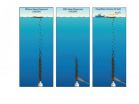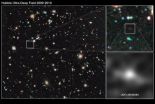(Press-News.org) Scientists are reporting discovery of a potential biochemical basis for the apparent cancer-fighting ability of broccoli and its veggie cousins. They found for the first time that certain substances in the vegetables appear to target and block a defective gene associated with cancer. Their report, which could lead to new strategies for preventing and treating cancer, appears in ACS' Journal of Medicinal Chemistry.
Fung-Lung Chung and colleagues showed in previous experiments that substances called isothiocyanates (or ITCs) — found in broccoli, cauliflower, watercress, and other cruciferous vegetables — appear to stop the growth of cancer. But nobody knew exactly how these substances work, a key to developing improved strategies for fighting cancer in humans. The tumor suppressor gene p53 appears to play a key role in keeping cells healthy and preventing them from starting the abnormal growth that is a hallmark of cancer. When mutated, p53 does not offer that protection, and those mutations occur in half of all human cancers. ITCs might work by targeting this gene, the report suggests.
The scientists studied the effects of certain naturally-occurring ITCs on a variety of cancer cells, including lung, breast and colon cancer, with and without the defective tumor suppressor gene. They found that ITCs are capable of removing the defective p53 protein but apparently leave the normal one alone. Drugs based on natural or custom-engineered ITCs could improve the effectiveness of current cancer treatments or lead to new strategies for treating and preventing cancer.
INFORMATION:
The authors acknowledged funding from the Ruth L. Kirschstein National Research Service Award and a grant from the National Cancer Institute of the National Institutes of Health.
ARTICLE FOR IMMEDIATE RELEASE
"Selective Depletion of Mutant p53 by Cancer Chemoprevention Isothiocyanates and Their Structure-Activity Relationships"
DOWNLOAD FULL TEXT ARTICLE
http://pubs.acs.org/stoken/presspac/presspac/full/10.1021/jm101199t
CONTACT:
Fung-Lung Chung, Ph.D.
Department of Oncology
Lombardi Comprehensive Cancer Center
Georgetown University
Washington, D.C. 20057
Phone: 202-687-3021
Fax: 202-687-1068
Email: flc6@georgetown.edu
Discovery of a biochemical basis for broccoli's cancer-fighting ability
2011-01-27
ELSE PRESS RELEASES FROM THIS DATE:
First report on fate of underwater dispersants in Deepwater Horizon oil spill
2011-01-27
Scientists are reporting that key chemical components of the 770,000 gallons of oil dispersants applied below the ocean surface in the Deepwater Horizon spill did mix with oil and gas spewing out of the damaged wellhead and remained in the deep ocean for two months or more without degrading. However, it was not possible to determine if the first deep ocean use of oil dispersants worked as planned in breaking up and dissipating the oil. Their study, the first peer-reviewed research published on the fate of oil dispersants added to underwater ocean environments, appears in ...
Getting more anti-cancer medicine into the blood
2011-01-27
Scientists are reporting successful application of the technology used in home devices to clean jewelry, dentures, and other items to make anticancer drugs like tamoxifen and paclitaxel dissolve more easily in body fluids, so they can better fight the disease. The process, described in ACS' journal, Langmuir, can make other poorly soluble materials more soluble, and has potential for improving the performance of dyes, paints, rust-proofing agents and other products.
In the report, Yuri M. Lvov and colleagues point out that many drugs, including some of the most powerful ...
Fish smile but some consumers frown at new genre of phosphate-free detergents
2011-01-27
Phosphate-free automatic dishwashing detergents — introduced to combat the phosphate-fed algae blooms that foul the nation's lakes and rivers — may be making the fish happy. But they're putting a frown on the faces of some consumers who say the new products leave dishes dirty. That's the topic of the cover story in the current edition of Chemical & Engineering News (C&EN), ACS' weekly newsmagazine.
C&EN Assistant Managing Editor Michael McCoy described how new laws in 16 states require manufacturers to eliminate phosphates from automatic dishwasher detergents sold in ...
Hubble finds a new contender for galaxy distance record
2011-01-27
Astronomers have pushed the NASA/ESA Hubble Space Telescope to its limits by finding what is plausibly the most distant and ancient object in the Universe [1] ever seen. Its light has travelled for 13.2 billion years to reach Hubble [2], which corresponds to a redshift around 10. The age of the Universe is 13.7 billion years.
The dim object, called UDFj-39546284, is likely to be a compact galaxy of blue stars that existed 480 million years after the Big Bang, only four percent of the Universe's current age. It is tiny. Over one hundred such mini-galaxies would be needed ...
Shockable cardiac arrests are more common in public than home
2011-01-27
Cardiac arrests that can be treated by electric stimulation, also known as shockable arrests, were found at a higher frequency in public settings than in the home, according to a National Institutes of Health-funded study appearing in the Jan. 27 issue of the New England Journal of Medicine.
The study compared home and public cardiac arrests under various scenarios. For example, the study considered whether bystanders or emergency medical services (EMS) personnel witnessed the cardiac arrest, and whether the person experiencing the arrest received treatment with an automatic ...
Hubble sees farther back in time than ever before
2011-01-27
Pasadena, CA— Astronomers have pushed NASA's Hubble Space Telescope to it limits by finding what they believe to be the most distant object ever seen in the universe—at a distance of 13.2 billion light years, some 3% of the age of universe. This places the object roughly 150 million light years more distant than the previous record holder. The observations provide the best insights yet into the birth of the first stars and galaxies and the evolution of the universe. The research is published in the 27th January edition of Nature.
The dim object is a compact galaxy made ...
NASA's Aqua Satellite sees Tropical Depression Anthony heading toward Australia
2011-01-27
NASA's Aqua Satellite captured a visible image of the former Tropical Storm Anthony, now weakened to a tropical depression, but forecasters aren't counting Anthony out yet. Despite its weakened condition Anthony continues to move west toward Queensland, Australia and into a more favorable area for sustaining a tropical cyclone.
The Atmospheric Infrared Sounder (AIRS) instrument that flies aboard NASA's Aqua satellite captured a visible image on Jan. 26 at 03:23 UTC of Tropical Depression Anthony in the South Pacific Ocean. The image revealed a cloud-filled center of the ...
NASA's TRMM Satellite sees TD10S strengthen into Tropical Storm Bianca
2011-01-27
The life of a cyclone is a complex one, and NASA satellites have kept track of a low that has now become Tropical Storm Bianca just off the northern coast of Western Australia.
What began as a low pressure system designated as System 98S on January 24, brought rains near Kuri Bay, Australia. On January 25, System 98S strengthened into the tenth tropical depression of the Southern Pacific Ocean hurricane season and was designated as "10S." Today, January 26, that low intensified into a tropical storm and was named Bianca.
NASA's Tropical Rainfall Measuring Mission (TRMM) ...
Gender and hygiene: Could cleanliness be hurting girls?
2011-01-27
CORVALLIS, Ore. – Little girls growing up in western society are expected to be neat and tidy – "all ribbon and curls" – and one researcher who studies science and gender differences thinks that emphasis may contribute to higher rates of certain diseases in adult women.
The link between increased hygiene and sanitation and higher rates of asthma, allergies and autoimmune disorders is known as the "hygiene hypothesis" and the link is well-documented. Yet the role of gender is rarely explored as part of this phenomenon.
Oregon State University philosopher Sharyn Clough ...
Food-borne bacteria causes potentially fatal heart infection
2011-01-27
Researchers at the University of Illinois at Chicago College of Medicine have found that particular strains of a food-borne bacteria are able to invade the heart, leading to serious and difficult-to-treat heart infections.
The study is available online in the Journal of Medical Microbiology.
The bacteria Listeria monocytogenes is commonly found in soft cheeses and chilled ready-to-eat products. For healthy individuals, listeria infections are usually mild, but for susceptible individuals and the elderly, infection can result in serious illness, usually associated with ...




